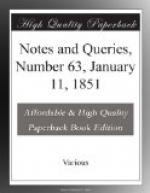Your correspondent, who subscribes himself JANUS DOUSA in the last number of “NOTES AND QUERIES,” ought to be able, and I dare say will be able, to supply through your columns information of which I have been long in search. In 1586 his great namesake printed at Lugd. Batav. a collection of Greek and Latin poems upon dead and living persons of distinction. Geoffrey Whitney, an Englishman, apparently residing at Leyden, and {23} who printed two works there in his own language, has fifteen six-line stanzas preceding Dousa’s collection, and he subjoins to it a translation of a copy of Dousa’s verses on the Earl of Leicester. Of these I have a memorandum, and they are not what I want; but what I am at a loss for is a copy of verses by Dousa, in the same volume, upon Sir Philip Sidney. It is many years since I saw the book, and I am not sure if there be not two copies of verses to Sidney, in which he is addressed as Princeps; and if your correspondent can furnish me with either, or both, I shall be much obliged to him.
Will you allow me to put another question relating to an old Dutch song-book that has lately fallen in my way; and though I can hardly expect a man like JANUS DOUSA to know anything about such a trifle, it is on some accounts a matter of importance to me, in connection with two early English songs, and one or other of your many friends may not object to aid me. The book is called De zingende Lootsman of de Vrolyke Boer, and it professes to be the tweede druk: the imprint is Te Amsteldam By S. en W. Koene, Boekdrukkers, Boek en Papierverkoopers, op de Linde Gragt. The information I request is the date of the work, for I can find none; and whether any first part of it is known in England, and where?
You are probably aware that the Dutch adopted not a few of our early tunes, and they translated also some of our early songs. These I am anxious to trace.
THE HERMIT OF HOLYPORT.
* * * * *
MINOR QUERIES.
Sir Cloudesley Shovel.—In Mrs. Markham’s History of England it is stated that Sir Cloudesley Shovel escaped from the wreck of his ship, but was murdered afterwards by a woman, who on her death-bed confessed it.
Is there any authentic record elsewhere published?
H.J.
Christopher Flecamore.—Walton says that Sir H. Wotton wrote his well-known definition of an ambassador at Augusta (Augsburg), in the Album of “Christopher Flecamore.” (Wordsworth, Eccl. Biog., vol. iv. p. 86., ed. 1839.) Can any of your correspondents tell me who this person was?
J.C.R.
“Earth has no Rage,” &c.—Can you, or any of your contributors or readers, inform one where the following couplet is to be found:
“Earth has no rage like love to
hatred turn’d,
And hell no fury like a woman scorn’d.”
I do not trouble you idly, as I have a particular reason for desiring to know the source of the lines.




